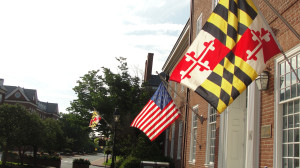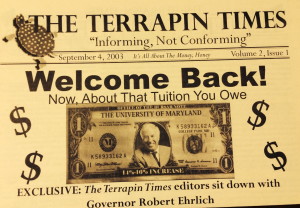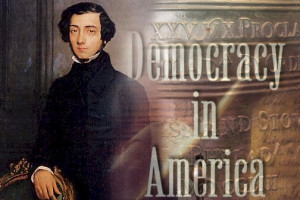On August 26, I was invited to address the first meeting of the fall 2014 semester for The Florida State University College Republicans. Over 150 students attended, with more than half of them being freshmen – which meant most of them were hearing from me on their second day of college. It was a great opportunity for me to impart some advice – from my own perspective.
I wanted to tell them about my own story, how I first became involved in the free-market movement. It was as a College Republican – at UCF, FAU, and later the University of Maryland. I also wanted to tell them stories I’ve seen personally of “infighting” among College Republican chapters at campuses across the country (including at FSU), which I saw firsthand during my more than three and a half years working as the Director of Membership and Campus Leadership for the Intercollegiate Studies Institute. And later, in my role as development director and Vice President of Advancement at The James Madison Institute, a role I serve in now.
In addition, I wanted to share with them how to be principled leaders and whether or not they should embark on politics as a career – or in what other ways they could be of service to their community, their state, and their nation.
Finally, I talked with them about the many political labels that are used to describe people politically– including conservative, libertarian, liberal, and progressive – and whether we might consider revising our descriptions. Some of my message to them is noted below.
****
As an undergraduate at both UCF and FAU, where I ultimately graduated from, I joined the College Republicans. However in both places, the College Republicans (CRs) only got organized and activated in and around election seasons. I remember after the 1996 Presidential election, during my freshman year of college, I asked the chair of the CRs at UCF “what next?” He replied, “That’s pretty much it for the next two years.” So, I shrugged my shoulders and went on to get involved in other non-political things, such as the UCF Concert Committee.
 Later, as a student at FAU, I went looking for a CR chapter and couldn’t find one. Then, just weeks ahead of the 2000 election (in which Palm Beach and Broward counties – where the FAU campuses are located – would play a major role) the club got activated and then died off again immediately after the election.
Later, as a student at FAU, I went looking for a CR chapter and couldn’t find one. Then, just weeks ahead of the 2000 election (in which Palm Beach and Broward counties – where the FAU campuses are located – would play a major role) the club got activated and then died off again immediately after the election.
In the fall of 2001, I started my graduate studies at the University of Maryland, pursuing an M.A. in History. For my entire first year there, I didn’t know anyone who was a conservative. My roommates were both Democrats, my fellow history graduate students were all to the left of center, and my professors were all clearly to the left of the Left. But being a guy who is open-minded and loves to discuss politics, I was thrilled to be on the largest college campus “inside the beltway.” I loved getting into political discussions and debates with some of my new left of center friends, some of which I remain friends with today.
But in the fall of 2002, I was walking around the Maryland campus and saw a flyer that advertised a College Republicans meeting. I was baffled. My first thought: “There are Republicans here?” I haven’t met one yet!
As a grad student, I didn’t really have time to get involved in activities or student clubs like this, but I had to go see for myself. It would be like going to the Washington, DC zoo to see what a panda looked like. Even though I was a Republican, I couldn’t believe there were enough Republicans here to form a club.
Sure enough, there were about 20 or so at this meeting. And they were all talking about getting this guy Bob Ehrlich elected to Governor. I politely signed my name on the sign-in sheet and left the club shaking my head – these people were delusional if they thought a Republican was going to get elected Governor in a state that was two-thirds Democrat, where a Republican Governor had not been elected in 36 years. And he was running against a Kennedy!
Because I signed that sign-in sheet that day, I kept getting emails from Seth, the club President. They sounded so personal too (later I would find out he was using some kind of new email merge feature). At the same time I continued to learn that Bob Ehrlich actually had a fighting chance to win. As the election grew closer, the polls grew tighter. So, I convinced myself that I needed to get involved. If this Republican was this close in a state that was so Democrat-heavy, I would be disappointed if he narrowly lost and I hadn’t done something. I got involved and he ended up winning.
After the election, unlike my experiences at UCF and FAU, there was no fatigue from these College Republicans at Maryland. When the “what next?” question came up, one of them, Bryan Shuy, who later became a good friend, told us of an idea he got from the Leadership Institute to start a conservative newspaper. I thought that was the best idea ever and offered to help. Little did I know forming that non-partisan conservative newspaper, which became completely independent of the College Republican group, would take over my life and lead me to where I am today.
During my time at Maryland, we published ten monthly issues. I not only was the News Editor and later, Managing Editor, I ended up becoming a reporter, interviewing people for stories, and managing the entire operations of a college newspaper. We had an incredible group of a dozen or so very committed editors and writers, and the group grew over time. The next year, The Terrapin Times ended up wining the “Paper of the Year” award from ISI’s Collegiate Network, from among over 100 papers on college campuses nationwide.
In 2004, I was offered a job by ISI to be their Director of Membership and Campus Leadership. Instead of continuing my education towards a Ph.D. in History, I took that job opportunity. Later, I would work as a development officer at ISI, and that led me to my current role leading the development efforts at The James Madison Institute (JMI), a free-market think tank in my home state of Florida. I have been fortunate to be able to help this organization grow. Over the past six years we have elevated the JMI brand, more than doubled our budget and staff, and bought a beautiful new headquarters in the historic Columns building in downtown Tallahassee, just a few blocks from the state capitol. I have also seen more than 100 college interns pass through here during that time, many of which are now working at liberty-minded organizations across the country.
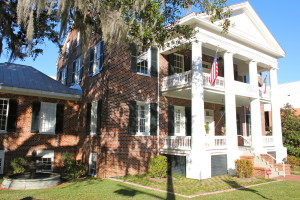
In 2002, I came across a flyer. Whoever posted that flyer changed my life, but of course it took my own motivation as well. My message to young people on college campuses who want to further ideas of liberty is to first get other people involved. Post flyers, table, host meaningful events, talk to classmates and neighbors. If you can bring just one person into the movement, you have made a major impact. Someone brought me in and it changed my life trajectory. I believe over the last twelve years I’ve been able to spread ideas through The Terrapin Times, ISI, and JMI. And I believe many people I have touched, have gone on to touch others as well.
For those who lead such groups, don’t be discouraged if people don’t show up to all the meetings. Keep calling, emailing, and texting them. Keep inviting. Who knows, they may just be waiting for someone to nudge them.
My next piece of advice is don’t get involved in infighting. I have talked at dozens (maybe hundreds) of College Republican chapters across the country, in probably more than 30 states. I certainly visited college student groups in over 30 states while working at ISI. Over time, I saw many good groups become overtaken by nasty infighting. Many leaders in these CR chapters think this involvement and leadership will be their first step to some elected office. That would be a foolish thought.
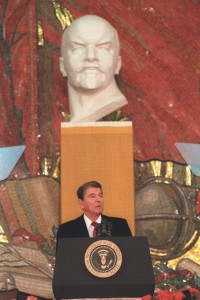
Karl Rove once said that the nastiest politics of his life was when he was a College Republican. In fact, he was once the Chairman of the College Republican National Committee. He later became Senior Advisor and Deputy Chief of Staff to the President of the United States, making every CRNC chairman since think they too would someday follow in the footsteps of Karl Rove. That too would be a foolish thought.
My advice is the best thing you can do to further the cause – as a College Republican or any young freedom activist – is to keep your focus on winning the battle of ideas. Don’t fight the wrong enemy. And realize that fighting the battle of ideas might mean helping a candidate win an election, but it might not. It might mean hosting speakers on campus, starting a conservative newspaper, or partnering with strange bedfellows on specific issues of agreement.
Ed Feulner, former President of the Heritage Foundation once said that, as a movement, we need to win by addition and multiplication, not by subtraction and division. This might mean picking and choosing what issues to focus on in order to bring new constituents into the tent.
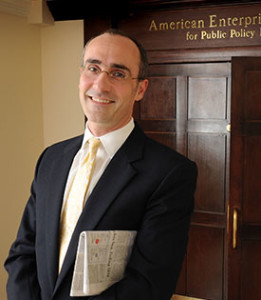
We also need to find good representatives. For example, as I told the FSU College Republicans (in response to a question about conservatives in the media), I do not think Ann Coulter is a good representative of our side. Is she bringing anyone into the movement? She might serve some cause of rallying those already in agreement with her, but I believe she’s reached a point where she is mostly interested in making money and that means throwing out “red meat” to those who agree with her and alienating those who don’t – or worse, causing those who are undecided to skip joining what appears to be the crazy side and move over to the opposing side.
Instead, I suggested a good role model for those on the Right might be Arthur Brooks, President of the American Enterprise Institute. He has a great message of how to bring people into the tent, and some of it has even challenged those on the Right to use better language to talk about why we believe in limited government and economic freedom and why we believe this is the best way to uplift people out of poverty.
Furthering ideas also means having principles and staying principled. Unfortunately, the FSU College Republicans have a very famous alumnus who has no principles: Charlie Crist. The man’s entire political career is characterized as moving where the wind blows. He has no compass. He has no principles. His entire career has been in politics, moving from one position to the next, constantly abandoning constituents and challenges to seek a higher office.
In contrast, Rick Scott was not a politician. His life started in poverty. Through hard work, he became a self-made man, started businesses, created thousands of jobs, and became a multi-millionaire. When the time was right, he decided to advance his principles through the medium of politics. Win or lose at the ballot box, the guy is a winner at life. His opponent, Charlie Crist, will never be a winner, even with wins at the ballot box.
This is one of the reasons I encourage every young person to not go into politics as a career. Don’t even plan for it. If it happens, it happens. You should not go into politics; you should only be called to politics. Do not look for a career in this field, only be called to serve.
College is a time to search for your vocation – and for most people it’s not a career in politics or public policy. This does not mean you should not stay engaged in politics and public policy – you certainly should be! We all have that responsibility as a citizen in this Republic. If and when the time is right to serve your community, your state, your country, in that way, then decide at that time to do it. For now, simply be engaged. Politics is not your main purpose in college. And it shouldn’t be anywhere.
Ask yourself: does politics actually help people? Does politics – in and of itself – help people? No. Politics is a game. You’ve probably heard the phrase, “office politics.” That very phrase refers to politics as an immature game. And for the most part, that’s what it is.
The ideal of political life is that men and women of great character should be called to serve their community, their state, their nation, when they have the best set of skills and leadership qualities to do so. The best way you can serve your community is to volunteer and be active in actually helping people. The volunteer at a soup kitchen does more for their community than most politicians do in their lifetime. When the visiting Frenchman, Alexis de Tocqueville, came to America in the 1830s he observed the greatest part about “democracy in America” was how men and women joined together in voluntary associations and mutual aid societies, to serve their neighbor. He thought these “intermediary institutions” (between the individual/family and government) were what made America so great.
How do you become a great leader and build character? One way is to read, listen, and learn from other great leaders. Read a biography on Steve Jobs or Abraham Lincoln. Find a mentor – whether that is a teacher, a business leader, or a friend. The best leaders practice servant leadership. They lead by serving others. They guide others. They help create other great leaders. Character is also built through experience: volunteering for that soup kitchen, being a big brother or big sister, taking the time to help a friend in need.
As we look to spread the ideas of economic freedom, traditional moral values, and continue this experiment in self-government, we probably have to come to grips to what we call ourselves and what labels we give our opponents. My advice to all people in the “conservative” movement is to stop calling our opponents “liberal.” They are not liberal.
The root of the word liberal means freedom. Those on the Left are not for freedom. They are control freaks. We are for a free market. They are for a closed market. And sometimes we come across Republicans who support this closed market. Think of things like Uber and the regulations on craft beer or food trucks. Many of those are an alliance between Big Government and Big Business. Being “pro-business” is not always the same as being “pro-free-market.”
A liberal economy is actually a free-market economy. And those on the Left have lost the privilege of being called “liberal.” I also do not want to label them as “progressive” because they are not for progress. In fact, their ideas have become regressive. The founders of our nation were classical liberals. They made advancements in human history so vast that they are perhaps the most progressive people in history. Today’s modern day Leftists do not align with our founders. They do not respect the specific roles the founders outlined for the various branches of government, much less the role of the states and the federal government. Today’s man of the Left is taking us back to a time of oligarchy and privilege, and away from freedom and personal responsibility.

I challenge all of those on the “Right” to recover the word liberal and be sure to stop calling our opponents by a label they truly do not deserve.
On a college campus, those who believe in economic freedom. traditional moral values, and free speech, are not the conservatives, they are the liberals. Your mission should be to fight the establishment, take down speech codes, and allow for greater academic freedom, and diversity of opinions. You are the dissidents because your opponents are for control and you are for freedom.
Welcome to the new age of being a freedom activist on a college campus. Now, get to that soup kitchen and show those on the Left and those in government that we know how to solve problems, not just talk about them.


